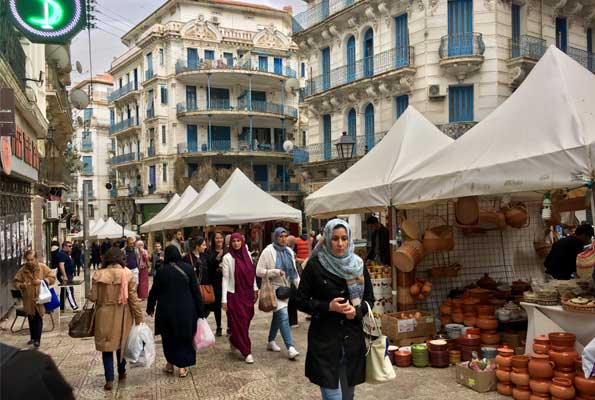The vast wealth of Algeria’s natural resources is no longer sufficient to conceal the country’s economy, lags significantly behind that of its French-speaking Maghreb neighbours, and is set to face significant challenges by 2028.
Before being inflated by an unusual, and transient, surge in hydrocarbon prices the following year, Algeria recorded the lowest GDP per capita among the three Maghreb nations in 2021 for the first time since achieving independence in 1962.
The 2021 numbers show that Algeria’s GDP per capita was USD 3,691, according to data from the World Bank. By comparison, Tunisia and Morocco, which had long held the bottom spot among the three Maghreb nations since independence, had GDP per capita figures of USD 3,807 and USD 3,795, respectively.
Given their comparative lack of natural resources compared to Algeria, one of the world’s top producers of hydrocarbons, Morocco and Tunisia’s surpassing of Algeria is remarkable.
Algeria produced 101 billion cubic meters of natural gas and about 900,000 barrels of oil per day in 2021, making it Africa’s third-largest oil producer. This is 53 times more gas and 24 times more oil than Tunisia, which has few natural resources but much more than Morocco, which has none.
Maghreb Neighbourhood
This is the outcome of Algeria’s unsuccessful economic policies implemented since independence and the country’s hydrocarbon production growth. Due to a lack of diversification, the Algerian economy is still largely dependent on hydrocarbons, thus making up around 90% of the country’s exports.
Compare that to neighbouring Maghreb countries, which have also succeeded in creating diversified and competitive economies, or to Western oil and gas producing nations like Canada and the UK, where oil and gas only make up 30% and 11% of their respective GDPs.
In addition to creating a welcoming environment for investment, Tunisia and Morocco have developed a wide range of sectors, placing them at the top of the continent regarding industrialization.
Algeria came at just eleventh place in the latest rankings of the African Development Bank (ADB), released in November 2022. Morocco and Tunisia were ranked second and fourth among the continent’s nations regarding industrialization. Morocco is poised to surpass South Africa shortly and take the top spot.
The two central neighbours of Algeria have made significant advancements in recent decades thanks to their wise economic strategies. While Tunisia was a pioneer, Morocco took off over the last 20 years and is now unique among Arab nations for having a vibrant automobile sector and unique among African countries for having high-speed railways. As the continent’s second-largest investor, possessing a highly developed banking system, and having made the national airline, Royal Air Maroc, the nation has emerged as a critical player on the continent.
According to Jeune Afrique magazine’s most recent annual list, released in March, Morocco will have no less than 56 of the 500 largest African companies in 2021, as opposed to just 12 for Algeria and 46 for Egypt, whose population is 2.8 times higher than Morocco’s.
Despite having a much lower population, Algeria trails behind Ivory Coast (27 enterprises) and Tunisia (21 companies).
Although Morocco’s success is mainly attributable to the sensible economic policies it has implemented and to the size of its domestic market, which is three times bigger than Tunisia’s but only a fifth as big as Algeria’s, it is also attributable to the fact that Morocco is a member of the French-speaking world, which has given it access to significant French investment and select markets in the vast neighbouring sub-Saharan Africa.
French-speaking sub-Saharan Africa was the starting point for the international expansion of Moroccan firms because of its proximity, its vitality, and its relative stability.
Real Risk For Algeria
Morocco’s foreign exchange reserves have grown recently, reaching an all-time high of USD 35.5 billion at the end of March 2023. Still, Algeria’s heavy reliance on hydrocarbons has caused the country’s foreign exchange reserves to collapse, along with an explosion in its indebtedness, all in an environment of declining oil prices.
As per IMF data, the country’s public debt has significantly increased, rising from 7.7% of GDP at the end of 2014 to 62.8% at the end of 2021 (before briefly declining to 52.4% at the end of 2022). Algeria was the least indebted of the 54 nations on the continent in 2014, but it has moved up to 26th place in just seven years. It is expected to soon join the top ten most indebted nations.
Given the return of hydrocarbon prices to pre-Ukraine war levels (or even lower overall) and their continued decline due to the rise of renewable energies, the economic situation will indeed get worse given the country’s still minimal diversification, compared to that of its Maghreb neighbours.
Algeria’s foreign exchange reserves will decrease by several billion dollars annually without implementing comprehensive economic reforms. The country’s current moderate policy of diversification may only be able to cover the future reduction in hydrocarbon income, which would be brought on by both the persistent decline in hydrocarbon prices and the decline in the export of hydrocarbons.
However, considering the size of the existing restrictions and the nation’s expanding population, further import reduction will be challenging.
Algeria should only be able to cover four months’ worth of imports by mid-2028, with its foreign exchange reserves reaching USD 66.1 billion at the end of March 2023 and assuming an annual decline to just USD 10 billion, compared with USD 13.2 billion over the 2018–2021 period. This is the level at which a country is considered close to bankruptcy.
To avoid total bankruptcy would require the government to turn to international financial institutions and enact difficult reforms similar to that of Venezuela, another powerful hydrocarbon-producing nation and Algeria’s ally.
Venezuela disintegrated by the middle of the previous decade despite having abundant natural resources, leading to over 6 million people migrating since 2015, a fifth of the country’s population, in one of the worst humanitarian catastrophes in recent memory.



